Murder in the French Alps
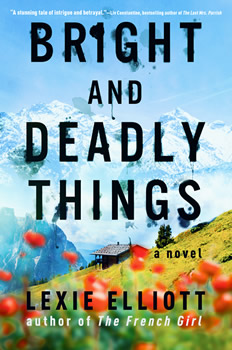 By Dawn Ius
By Dawn Ius
Lexie Elliott does a magnificent job of reminding readers why the French Alps are one of the most coveted tourist destinations in the world—this setting, specifically Chalet des Anglais, utterly sparkles in her latest novel, BRIGHT AND DEADLY THINGS.
But of course, BRIGHT AND DEADLY THINGS is a murder mystery, and the juxtaposition of “bright” and “deadly” is a recipe for a deliciously suspenseful read—a slow burn that by the end will creep you out in the best possible way.
In it, a remote back-to-basics mountaintop retreat turns deadly when a recently widowed Oxford fellow finds herself in the crosshairs of her late husband’s dangerous secrets. Suddenly, the place where Emily had hoped to grieve and heal becomes somewhere much darker, and if she wants to survive in this location, she’ll need to quickly separate friend from foe.
In this The Big Thrill exclusive interview, Elliott shares insight into how she transitioned from banker to writer, the ways in which she has grown as an author since her 2018 debut, and why she chose the French Alps in which to set this well-plotted mystery.
I read that your background is in banking—what drew you to writing novels, and how difficult was it to make that transition?
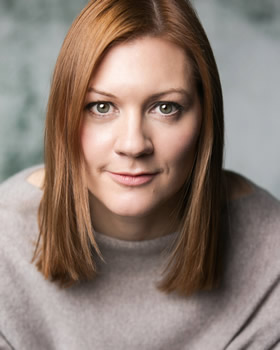
Credit: Nick James Photography
I always wanted to be a writer; as soon as I understood that books had authors, that’s what I wanted to be. But as I grew older, I became fairly pragmatic: Making a living out of writing fiction is such a difficult thing to do, and I didn’t come from a background with any kind of financial safety net, so I studied physics at university as that was more likely to lead to a job that would actually pay the bills. I never gave up on the dream of writing, though, and I used to scribble away in whatever spare time I had. My debut novel was written in the period after I lost my job as a result of the global financial crisis, as so many did in the financial industry. Although banking and writing are of course very different, I think the discipline and professionalism that I developed during my financial career have been really helpful to me in my approach to writing, especially in the years when I was juggling both careers (I only became a fulltime writer in 2021). The hardest thing about transitioning to writing fulltime has been dealing with the isolation—I really miss having a bustling office to go to.
Your first novel, The French Girl, was published in 2018. How would you say you have advanced as a writer in terms of skill from that debut to your latest release, BRIGHT AND DEADLY THINGS? Is there one a single thing you’ve learned about writing thrillers over the years that you wish you’d known when you started?
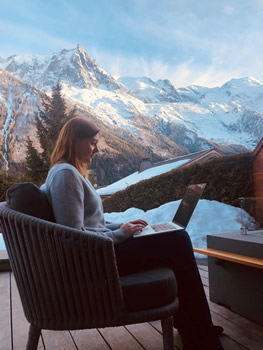
Like with any craft, one’s writing does improve with practice and experience, but I’d say that the editing process is the area where I’ve made the most progress. I suppose that I originally thought all the creativity in the process happened in the first draft, but now I have much more appreciation for that crucial second draft: that’s where you can apply proper rigor to ensure that everything in the manuscript has a purpose—that it advances the story and explores the themes you want to address. That sounds dry, but it’s really not, and it requires creativity too: There’s a real pleasure in finding exactly the right sentence to shift the emphasis in a chapter, and exactly the right place to put it. I don’t know that there’s one specific thing that I wish I’d known when I started—except maybe to never read reviews! I now know that I can read an absolutely glowing review and nevertheless get fixated on a single sentence that is merely lukewarm; that way madness lies, so I try to read hardly any of them at all.
Can you pinpoint a moment or incident that sparked the idea for BRIGHT AND DEADLY THINGS?
The novel is set in a rustic chalet in the French Alps, the Chalet des Anglais, which is in fact a real place. In the year 2000, when I was working on my doctorate, I was lucky enough to receive an invitation to join an academic party there, which turned out to be an utterly delightful week in which nobody died and everyone got along swimmingly! However, it was such an atmospheric location that it stuck in my mind; when I first began to consider setting a novel in the world of Oxford academia, I was looking for a way to avoid producing just another “campus thriller.” I remembered the Chalet, and I instantly recognized that it was the perfect setting for what I wanted to create. My fictional Chalet des Anglais is not exactly the same as the real one, both because my memory is imperfect after over two decades (and the global pandemic prevented me from conducting a research trip) and because I tweaked the layout and surrounding area a little to better suit the story, but I hope that I managed to capture something of the atmosphere despite those changes.
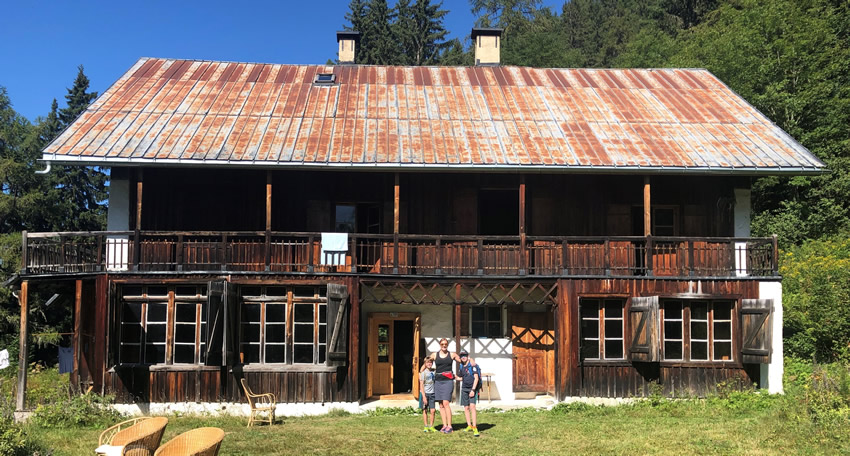
I’m a sucker for a locked room mystery style of novel. Did you have any specific books or movies knocking around in your head while you wrote this?
I wouldn’t call this a locked room mystery in the strictest sense of that phrase, but it’s certainly a “closed environment” mystery, where the characters can’t easily escape the location and the reader is aware that the antagonist must lie within the cast of characters they’ve already met—and I’m a sucker for that set-up, both as a writer and a reader! I love the claustrophobic atmosphere that you can create with it, which is so helpful for building tension in psychological thrillers particularly. I didn’t have any specific books or movies in mind, but it was certainly a deliberate choice to use this technique.

Setting is such an important element of this book—you describe the location beautifully! (It’s a bucket list location for me.) How did you arrive at the setting of the French Alps?
Thank you! It helps that, as I mentioned above, the Chalet des Anglais does actually exist and that I’ve been there. I suppose I could have picked up the chalet and placed it somewhere else for the purposes of the novel, but I didn’t even consider that. The true location is an absolutely stunning one—good choice for your bucket list; I definitely recommend a visit!—and I’m quite familiar with that region as we often spend family vacation time in nearby Chamonix, so I suppose I felt comfortable leaving it right where it is.
Can you please talk a little about the book’s main character, Emily, and how she took shape for you?
As is usually the case with my main characters, Emily presented herself to me pretty much fully formed. There’s much about her life—her time spent at Oxford University, even her chosen area of study—that was instantly familiar to me, though Emily is not a version of me; we are quite different personality-wise, and I made very different choices at certain crucial points in life. One of Emily’s key relationships in her life is of course that with her deceased husband, and that took some time to unfold for me: Just like the readers, I had to get to know him through Emily’s memories.
I love how fully formed all your secondary characters are—they all have interior lives, colorful backgrounds, a designated place in the story. Can you talk about writing those characters? Who did you have the most fun with? Who was most challenging?

Characterization is so very important to me; it’s lovely to hear that you appreciated that. Some of them presented themselves to me right from the beginning, and some were initially very peripheral but somehow found a way to grow their part! I had a lot of fun with Olive, both in the way her mind works and the way the rest of the group reacts to her. James was probably the most challenging: He’s quite a complex character. He sits absolutely on the knife edge: There’s a lot of potential for good within him, but the environment he grew up in has conditioned him towards callous, selfish behaviour; it was a challenge to get that portrayal just right without descending into caricature.
Running, swimming, cycling—you like to keep active. What role does this athleticism play in your writing?
I do indeed like to keep active and always have; I get a little scratchy and mutinous without exercise! Writing is such a sedentary occupation that I would need to exercise anyway to counter that inactivity, but I find that cardio in particular—a long run or a long swim—has a way of scrubbing my mind clean of all the minutia of everyday life, which then leaves space for all sorts of ideas to bubble up. If I’m struggling with something in my writing, I don’t keep beating away at it fruitlessly; instead, I might pull on my trainers and go for a run. Even if I don’t come back with a fresh idea on how to approach it, at least I’ll have got some exercise in.
I laughed out loud when in your bio, you mention that you swam the English Channel solo, and follow it up with, “She won’t be doing that again.” So definitive! What about that experience has you saying “hard pass” if you had the opportunity to do it again?
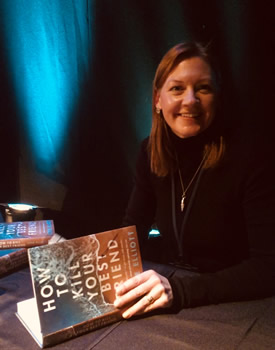
Oh goodness! Almost everything—and that’s not a joke. The crossing itself is extremely cold and extremely long, and the training for it is extremely cold and extremely long and also extremely dull (and that’s from someone who generally really enjoys endurance training). I don’t think anyone swims across the Channel for the fun of it; it has to be a compulsion, otherwise you’d just give up. I suppose the compulsion is gone now that I’ve done it. On top of that, people usually do things again because they think they can do it better the second time, which usually means faster, but you could be in much better physical shape and yet cross in a slower time, or not at all, because so much depends on the conditions on the day. I’m so, so very proud of myself for having managed it, and I have a lot of fabulous memories from that period in my life, but there’s absolutely no need to repeat the endeavor!
What can you share about what you’re working on next?
Almost nothing—sorry! I’ve been working on quite a detailed outline for one particular idea, but I’m not quite certain that it will indeed be what I’ll write next, so I’d better keep my own counsel for the moment.











